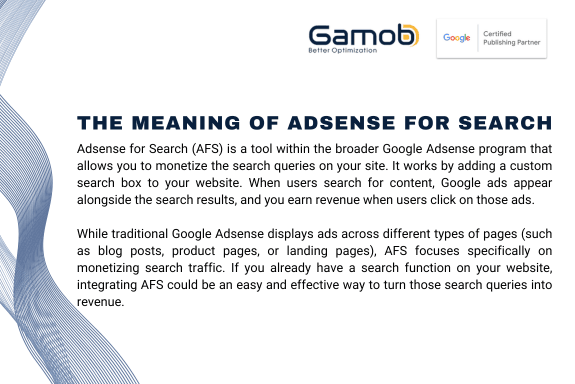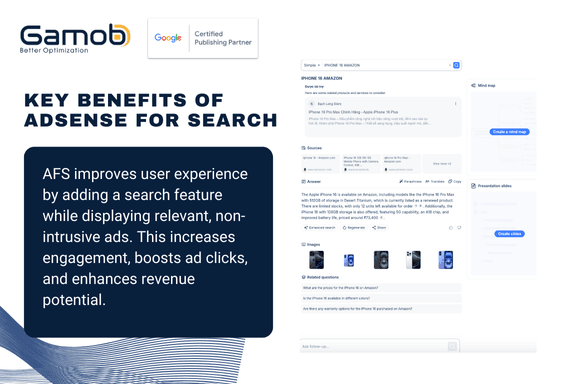
Subscribe to receive the latest blog posts to your inbox every week.
By subscribing you agree to with our Privacy Policy.
As a website owner, blogger, or digital marketer, you're likely always on the lookout for new ways to monetize your site. Google Adsense has been one of the most popular and reliable methods for doing this. But did you know that there's a specialized tool within Adsense designed to help you earn revenue from your website's search traffic? This tool is called Adsense for Search (AFS), and it could be exactly what you need to unlock a new revenue stream.
In this blog, we’ll explore Adsense for Search, discuss when it’s the right choice for your website, and highlight the key benefits it offers. By the end, you’ll have a clearer idea of whether or not AFS is a good fit for your monetization strategy.
What is Adsense for Search (AFS)?
Before diving into whether AFS is right for your website, let's first define it.
Adsense for Search (AFS) is a tool within the broader Google Adsense program that allows you to monetize the search queries on your site. It works by adding a custom search box to your website. When users search for content, Google ads appear alongside the search results, and you earn revenue when users click on those ads.
While traditional Google Adsense displays ads across different types of pages (such as blog posts, product pages, or landing pages), AFS focuses specifically on monetizing search traffic. If you already have a search function on your website, integrating AFS could be an easy and effective way to turn those search queries into revenue.

Key Benefits of Adsense for Search
Now that you understand what AFS is, let’s dive into the key benefits it offers.

1. Unlock a New Revenue Stream
One of the most compelling reasons to consider using Adsense for Search is that it helps you monetize an often-overlooked area of your website—search activity.
- How it works: Every time a user performs a search on your site, relevant Google ads are displayed on the search results page.
- Why it’s beneficial: Without AFS, this search behavior wouldn't generate any revenue. But with AFS, you can capitalize on this traffic and generate additional income from your site’s search activity.
This is especially useful if your website receives a steady stream of search traffic but doesn’t have other immediate monetization opportunities in place for those users.
2. Increase User Engagement
Adding a search feature to your site, and monetizing it through AFS, can actually improve your website’s user engagement.
- How it works: By providing an easy-to-use search box, you make it easier for users to find relevant content on your site.
- Why it’s beneficial: When visitors can quickly find what they’re looking for, they’re likely to spend more time on your site and return in the future. This, in turn, can increase the overall engagement with your content, leading to more opportunities for monetization.
The user experience benefits of AFS are clear: users will enjoy browsing your site more, and you’ll be able to generate income from the searches they perform.
3. Relevant Ads = Higher CTR (Click-Through Rate)
One of the biggest advantages of AFS is that it displays highly relevant ads to users based on their search queries.
- How it works: When users perform searches on your site, Google serves ads that are directly related to their search term. For instance, if a user searches for "best running shoes," relevant ads for shoes or sportswear will appear.
- Why it’s beneficial: Because the ads are so relevant to the user’s intent, they’re more likely to engage with them. Higher click-through rates (CTR) typically lead to higher revenue for website owners.
This targeting makes AFS much more effective than traditional display ads, which are based on page content rather than user behavior. By showing ads that align with what users are actively searching for, AFS can boost your CTR and ultimately your earnings.
4. Non-Intrusive Monetization
With AFS, ads are displayed on the search results page, which means they don’t interrupt or detract from the content on your site.
- How it works: Ads appear beside or below the search results, in a way that is non-intrusive to the overall user experience.
- Why it’s beneficial: Traditional display ads are sometimes viewed as disruptive, but because AFS only displays ads on search result pages, it doesn’t interfere with the normal flow of your content. Users can still access the content they were looking for, while you generate revenue passively from their search activity.
This approach can help strike a balance between monetization and maintaining a positive user experience, which is crucial for keeping visitors coming back to your site.
When Should You Consider Using Adsense for Search?
While AFS has many advantages, it’s not suitable for every website. Here are some key factors to consider when deciding whether to integrate Adsense for Search:
1. You Have a Functional Search Feature
AFS requires that your website has an active search function. This is a must-have, as the ads are displayed based on the search queries users input. If you don’t already have a search box or search bar on your website, you’ll need to implement one before using AFS.
2. Your Website Gets Significant Search Traffic
AFS works best for websites that receive a steady stream of internal search traffic. If users aren’t searching for content on your site, there won’t be many opportunities for monetization through search ads.
- If your site has a lot of content that encourages users to search (e.g., a blog, product catalog, or knowledge base), then you’re likely to see significant returns from AFS.
- Sites with a large user base and frequent searches stand to benefit the most from AFS.
When Should You NOT Use Adsense for Search?
While AFS has many benefits, it’s not for everyone. Consider avoiding AFS if:
1. Your Website Doesn’t Have a Search Function
If your website lacks a search bar or search tool, AFS will not work. It’s essential to have this feature in place before integrating AFS.
2. Low or No Search Traffic
If your site doesn’t receive a significant amount of search activity, AFS may not generate enough revenue to justify the effort of integration. It’s important to have a steady stream of search queries for AFS to be effective.
3. Your Website Has Very Limited Content or Products
If your website doesn’t have enough content or products to generate frequent searches, AFS will have limited impact. It’s more suitable for sites with rich content or diverse offerings that attract frequent searches.
Is Adsense for Search Right for Your Website?
If you have a search function on your site and you generate steady search traffic, Adsense for Search could be a great way to unlock new revenue. The targeted, relevant ads displayed alongside search results can increase CTR, enhance user engagement, and provide a non-intrusive monetization method that complements your content.
However, if your website lacks search functionality or doesn't generate much search traffic, AFS may not provide the results you’re looking for.
Ultimately, the decision to use AFS depends on your website’s content, traffic, and goals. If you meet the criteria, AFS can be a valuable addition to your monetization strategy.
Ready to start monetizing your site’s search activity? If you’re unsure where to start or need help optimizing your Adsense for Search integration, contact Gamob, a Google Certified Publishing Partner. Our experts can help you get the most out of AFS and other monetization strategies to boost your site’s revenue.